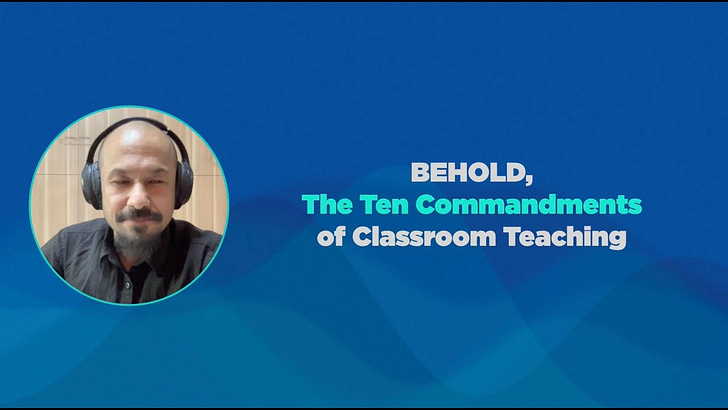Video: The Ten Commandments of Classroom Teaching
Why 10? Because 10 commandments sound pedagogically satisfying !!!
George Carlin, one of my favorite comedians ever, during his famous “The Ten Commandments in the Bible” skit had said this about the number 10.
“Why 10, why not 9? Or 11? I’ll tell you why. Cause’ 10 sounds official. 10 sounds important. If it was 11, people wouldn’t take it seriously. 10 is the basis of the decimal system. It’s a psychologically satisfying number. The top 10. The 10 Most Wanted. The 10 Best Dressed. So having 10 commandments was really a marketing decision.”
In a similar vein, here I’m presenting you all, the Ten Commandments of Classroom Teaching. Hoping that these 10 commandments sound pedagogically satisfying for all the teachers.
Here in this video, I also add a few more details and explanation. So make sure you watch it as well.
The 10 Commandments of Classroom Teaching:
1. Thou shalt begin with the end in mind, for teaching must serve a specific purpose and achieve a specific goal.
2. Thou shalt know thy students, for teaching must be aligned with the prior knowledge, abilities, needs, and concerns of those who are learning.
3. Thou shalt design instruction on the basis of where thy students are in the novice-expert continuum, for the novices learn differently than the experts.
4. Thou shalt make sure the students are “attending” all the time, for attention is the gateway of learning.
5. Thou shalt provide explicit instructions, explanation, and scaffold in the beginning to build the foundation knowledge and eventually lead the students to discovery, experiments, and autonomy to build and refine their skills.
6. Thou shalt break the instructions into manageable chunks, for the mind can be easily overloaded.
7. Thou shalt repeat key concepts and reinforce learning through practice, feedback and reflection, for repetition is the mother of retention/learning.
8. Thou shalt use assessments to gauge learning and adjust teaching accordingly, for teaching becomes blind without knowing where thy students are heading.
9. Thou shalt use technology to enhance teaching, but not rely on it exclusively, for technology is a tool, not a substitute for good teaching.
10. Thou shalt always strive to improve thy teaching through self-reflection and exploration, for the pursuit of excellence is a lifelong journey.
There were at least 10 more popping in my head, but I had to take Carlin’s suggestion. What would you have added in this list? Let me know, if you have any suggestions.



